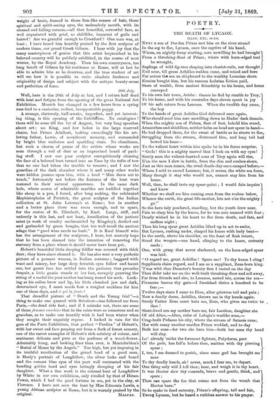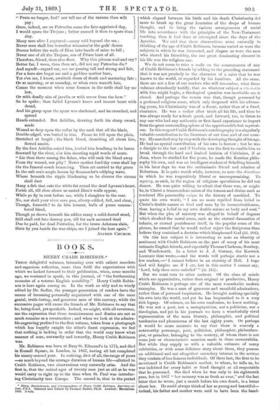POETRY.
THE DEATH OF LYCAON.
ILIAD, xxi., 34-135.
NEXT a son of Darden Priam met him on the river strand In the act to flee, Lycaon, once the captive of his hand, Whom, on nightly foray starting, sore unwilling he had brought From a threshing-floor of Priam, where with keen-edged tool
he wrought, Saplings of wild fig-tree shaping into chariot-rails, nor thought Evil near, till great Achilles sudden came, and seized and bore Far across the sea on shipboard to the wealthy Lemnian shore. Eundus bought him, but his ransom Imbrian Eetion paid, Store of wealth, from ancient friendship to his house, and home conveyed To his own fair town, Arisbe : thence he fled by stealth to Troy, To his home, and with his comrades days eleven spent in joy Of his safe return from Lemnos. When the twelfth day came, the boy To the hands of great Achilles God delivered once again, Who should send him sore unwilling down to Hades' dark domain. When the mighty son of Peleus, fleet of foot, beheld him stand, Armourless and shieldless, neither helm on head nor spear in hand— He had dropped them, for the sweat of battle as he strove to flee, Struggling from the stream, distressed him, and long toil had
bowed his knee—
To the valiant heart within him spake he in his fierce surprise, " Gods ! this is a mighty marvel that I look on with my eyes ! Surely soon the valiant-hearted sons of Troy again will rise, E'en the men I slew in battle, from the dim and sunless shore, Just as this man comes, the cruel death-day once escaped before,— Whom I sold to sacred Lemnos; but, it seems, the white sea foam, Many though it stay who would not, cannot stay him from his home.
Well, then, he shall taste my spear-point ; I would fain inquirel and know Whether we shall see him coming even from the realms below, Whence the earth, the great life-mother, lets not e'en the mighty go."
So the hero inly pondered, standing, but the youth drew near, Fain to clasp him by the knees, for he was sore amazed with fear ; Dearly wished he in his heart to flee from death, and fate, and endless night ; Then his long spear great Achilles lifted up in act to smite, But Lycaon, rushing under, clasped his knees with body bent— In the earth, above his shoulder, on the feast of flesh intent, Stood the weapon—one hand, clinging to the knees, entreaty made ; One, with grasp that never slackened, on the keen-edged spear was laid.
" 0 regard me, great Achilles ! Spare me I To thy knees I cling ! Suppliants claim regard, and I am as a suppliant, Zeus-born king. 'Twas with thee Demeter's bounty first I tasted on the day Thou didst take me on the well-built threshing-floor and sell away, Far from friends and sire, to Lemnos, sacred isle, across the sea- Fivescore beeves thy gain—I furnished thrice a hundred to be free ;- Twelve days since I came to Ilion, after grievous toil and pain ; Now a deadly doom, Achilles, throws me in thy hands again. Surely Father Zeus must hate me, Zeus, who gives me twice to thee !
Short-lived son my mother bare me, fair Laothoe, daughter she Of old Altes,—Altes, ruler of Lelegia's warlike sons,- Crag-built Pedasus his city,• where the stream of Satnois runs ; Her with many another maiden Priam wedded, and to-day Both her sons—for two she bare him—both her sons thy hand will slay.
Lo ! already 'midst the foremost fighters, Polydorus, peer Of the gods, has fall'n before thee, smitten with thy piercing' spear ; I, too, I am doomed to perish, since some god has brought me near To thy deadly hands, ah ! never, much I fear me, to depart. One thing only will I tell thee ; hear, and weigh it in thy heart. It was Hector slew thy comrade, brave and gentle, think, and') spare ; Thou can spare the foe that comes not from the womb that Hector bare."
So he spake in fond entreaty, Priam's offspring, tall and fair, I Young Lycaon, but he heard a ruthless answer to his prayer. " Prate no longer, fool! nor tell me of the ransom thou wilt 1 pay ;
Once, indeed, ere on Patroclus came the fate-appointed day, } I would spare the Trojans ; better seemed it then to spare than J slay.
Many men alive I captured—many sold beyond the sea ; Never man shall live hereafter whomsoe'er the gods' decree Dooms before the walls of Ilion into hands of mine to fall ; Never one of all the Trojans, sou of Priam least of all. Therefore, friend, thou also diest. Why this piteous wail and cry? Better far, I ween, than thou art, did not my Patroclus die? And myself—regard me, see me passing tall and strong and fair, For a hero sire begat me and a goddess mother bare, Yet e'en me, I know, awaiteth doom of death and mastering fate ; Or at morning, or at noonday, or when even waxeth late, Comes the moment when some foeman in the strife shall lay me low, Or with deadly aim of javelin or with arrow from the bow."
So he spake ; then failed Lycaon's knees and inmost heart with dread, And his grasp upon the spear was slackened, and he crouched, and spread Hands extended. But Achilles, drawing forth his sharp sword, made Wound so deep upon the collar by the neck that all the blade, Double-edged, was buried in him. Prone he fell upon the plain, Stretched at length ; the black blood, drenching all about him, flowed amain.
By the foot Achilles seized him, hurled him headlong to be borne Seaward by the river, o'er him shouting rapid words of scorn. " Lie thou there among the fishes, who will suck the blood away From thy wound, nor pity ! Never mother fond thy corse shall lay On the funeral couch lamenting. Thou art carried to thy grave In the salt sea's ample bosom by Scamander's eddying wave, Where beneath the ripple blackening as he cleaves the stream shall dart Many a fish that eats the white fat round the dead Lycaon's heart. Perish all, till close above us sacred Ilion's walls appear, While ye fly in rout before me, while I slaughter in the rear. } No, nor shall your river save you, silvery-eddied, full, and clear, Though, forsooth ! to do him honour, bulls of yours unnum-1 bered bleed, Though ye drown beneath his eddies many a solid-footed steed, Still shall evil fate destroy you, till for each accursed deed Due be paid, for dead Patroclus, for the brave Achmans slain, Slain by you beside the war-ships, ere I joined the host again."
ALFRED CHURCH.































 Previous page
Previous page